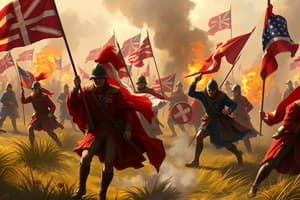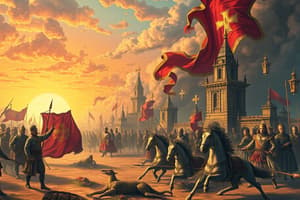Podcast
Questions and Answers
What is the main focus of logic?
What is the main focus of logic?
- Using sound and rhythm
- Dealing with numbers and counting
- Analyzing information and arguments (correct)
- Studying shapes and spaces
Which ancient discipline considered logic as one of its central aspects?
Which ancient discipline considered logic as one of its central aspects?
- Arithmetic
- Astronomy
- Philosophy (correct)
- Music
Where did geometry find extensive use during the Roman Empire?
Where did geometry find extensive use during the Roman Empire?
- In analyzing celestial objects
- In architecture, engineering, and construction (correct)
- In developing different music genres
- In predicting seasonal changes
What is the primary benefit of music education according to the text?
What is the primary benefit of music education according to the text?
How has arithmetic evolved over time?
How has arithmetic evolved over time?
Flashcards are hidden until you start studying
Study Notes
Seven Arts
The seven arts were traditionally considered the cornerstone of any good education in medieval Europe. They encompassed various forms of literary knowledge such as grammar, rhetoric, logic, geometry, arithmetic, music, and astronomy. These disciplines were seen as essential skills for individuals who pursued higher learning, especially those studying to become civil servants, lawyers, merchants, and teachers. In this article, we explore each of these seven arts in detail with reference to their historical significance and how they have evolved over time.
Grammar
Grammar was one of the most fundamental parts of the seven liberal arts. It is defined as a set of rules that governs written expression. This includes matters like punctuation, sentence structure, syntax, pronunciation, and accent. As a part of the seven liberal arts, grammar was taught using Latin texts, which helped students understand the rules of Latin grammar better. Today, grammar remains a critical skill that helps us communicate effectively through writing and speaking.
Rhetoric
Rhetoric is another key component of the seven liberal arts. It deals with the art of persuasion and is often associated with the ability to speak well. The principles of rhetoric include elements such as language, structure, and argumentation. In medieval Europe, rhetoric was taught through the study of classical texts, with an emphasis on the works of Cicero and Quintilian. Today, rhetoric is still a significant part of public speaking and communication.
Logic
Logic is an important part of reasoning and understanding. It involves analyzing information and arguments to determine whether they are valid and sound. Logic has been studied since ancient times and was considered one of the central disciplines of philosophy. It was taught through formal debates and discussions, encouraging students to think critically and logically. While still relevant today, logic has found applications in computer science, AI, and machine learning.
Geometry
Geometry is the study of shapes and spaces, dealing with points, lines, angles, surfaces, and solids. Originating from the Greek word 'geometria' meaning earth measurement, it was used extensively in architecture, engineering, and construction during the Roman Empire. Though its role in day-to-day life may have diminished, geometry continues to play a crucial role in modern industries like technology, engineering, and even finance.
Arithmetic
Arithmetic is concerned with numbers, operations on numbers, and counting. It is one of the oldest known sciences. Once considered a basic tool of daily living, arithmetic now serves as the foundation for other mathematical fields such as algebra and calculus. Today, arithmetic is indispensable not only in everyday contexts but also in a wide range of professions.
Music
Music is a form of art that uses sound and rhythm. Initially, music was primarily associated with chanting and singing religious texts. Over time, however, it expanded into different genres and styles. Educationally, music is considered beneficial because it stimulates creativity, enhances concentration, and contributes positively to emotional development. Despite changes in society, music continues to be an integral part of culture worldwide.
Astronomy
Astronomy is the scientific study of celestial objects and phenomena. Since prehistoric times, humans have looked up at the night sky and marveled at the stars. Early astronomers observed patterns in the movement of planets and stars, which led them to develop calendars and predict seasonal changes. Modern astronomy has progressed far beyond these early observations, providing insights into the vastness of space and our place within it.
In conclusion, while the specific nature of the subjects might vary slightly depending upon social, cultural, and technological advancements, the essence of the seven liberal arts remains largely unchanged. Their contributions continue to shape our world in significant ways.
Studying That Suits You
Use AI to generate personalized quizzes and flashcards to suit your learning preferences.




